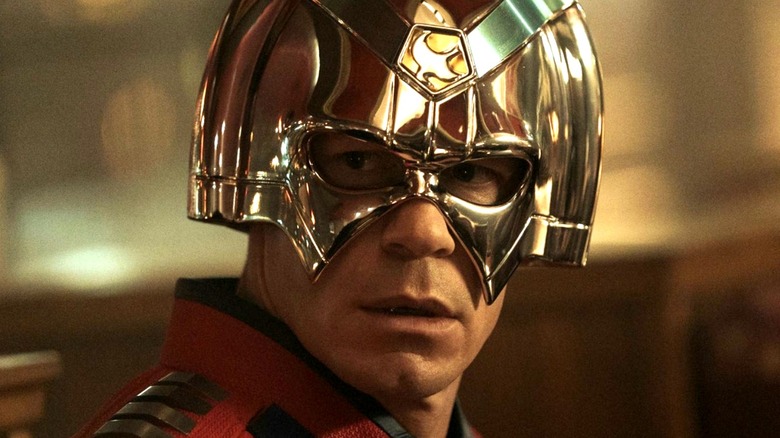
As the "Peacemaker" first season finale drew to a close, my first thought was, "It was always about that intro." For six weeks, the neon-lit dance that opened James Gunn's "The Suicide Squad" follow-up dominated social media. But, in the end, it was more than just a meme-able credits sequence. More than anything else, the finale revealed that it was a declaration of artistic intent.
All of the major "Peacemaker" characters appear in the Wig Wam-synched dance number, but they're not alone. The show's deep bench of supporting players gets in on the action, too. Jamil the janitor jetés with his mop mere seconds before Auggie's elderly neighbor cuts a rug, and Eagly brings the whole thing home. It's obvious that Gunn cares about each of these characters equally, even if their time on "Peacemaker" is brief.
This devotion is what separates HBO Max's hit show from so many of its comic book TV brethren. In a world where every new superhero show feels like a soft-launch for the next series and "surprise" cameos are all but inevitable, "Peacemaker" works because it builds its own universe out of the characters its creators want to focus on, not the ones the studio has bigger plans for, and it clearly loves them in all their messy, awkwardly dancing glory. Yes, we've ranked them here, but really? All of the characters on "Peacemaker" are important. Every single one.
The Justice League
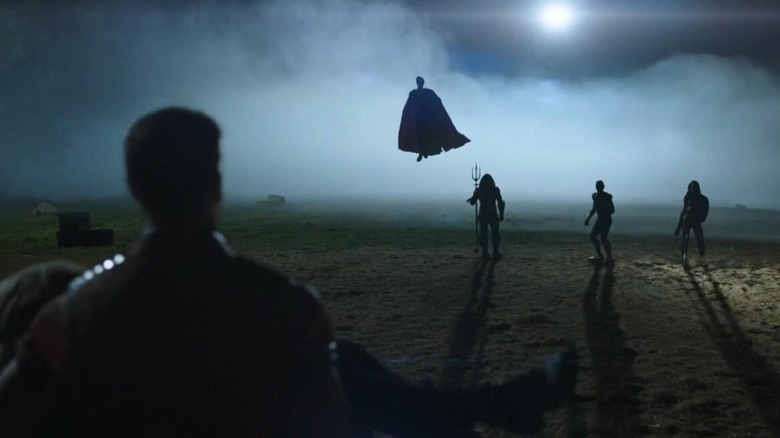
The Justice League sucks in "Peacemaker." The team arrives too late to save the day and appears to know absolutely nothing about the Butterflies and their Cow. Also, one of their members bonks fish — and not with his trident.
You wouldn't think that it's important to bring up the rumors that Arthur Curry is living out his ultimate "The Shape of Water" fantasies, but the shadow that he and the rest of the Justice League cast over "Peacemaker" makes them notable players in Gunn's story. Peacemaker is malleable. Tell him that climate change is false, and he'll believe it. Tell him that a guy in an aquarium pockets $50 bucks to let Arthur Curry have his way with a sturgeon, and he'll believe that, too. DC's best-known heroes shape the ideologies that drive Christopher Smith, the ones that twist him into a weapon for good or ill at any given moment. That the League only appears after he's made a genuine decision for himself isn't mere fan service. It's thematic gold.
That said, the members of the League have the least amount of screentime of any of the characters on "Peacemaker," and Peacemaker claims that the Flash is an unbearable d-bag, so they rank at the bottom of this list.
Auggie's Neighbor
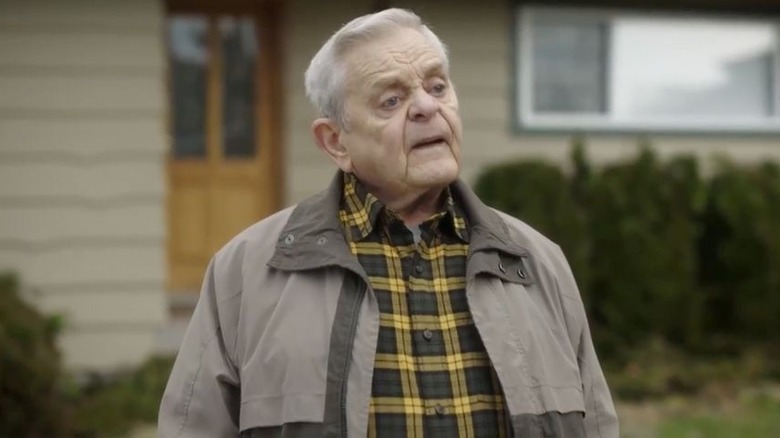
The wacky next-door neighbor is a well-worn trope. The history of television is rife with them. "WandaVision" knew this when it gave us Agatha Harkness, and James Gunn knew it when he created Auggie's neighbor, the cranky geriatric played by Mel Tuck of "Legends of Tomorrow" fame. But Auggie's neighbor is less of a riff on Fred Mertz or Eddie Haskell than he is a thorn in Peacemaker's side. In his most memorable scene, he eviscerates Peacemaker's confidence. "Do you have a coterie of supervillains?" he sneers. "My coterie of supervillains is six-feet f***ing under!" Peacemaker retorts. Auggie's neighbor replies, "There, you see? Batman doesn't kill people."
Yes, this conversation leads to a miraculous riff on the Caped Crusader's flaws, but its primary function is to stack the deck against poor Chris Smith. Smith's path to the dark side began at home. Every time he returns, his journey grows longer. As this conversation with Auggie's neighbor proves, Peacemaker's dad does not need to be present to prolong his son's trauma. That's what wacky neighbors are for.
Keeya
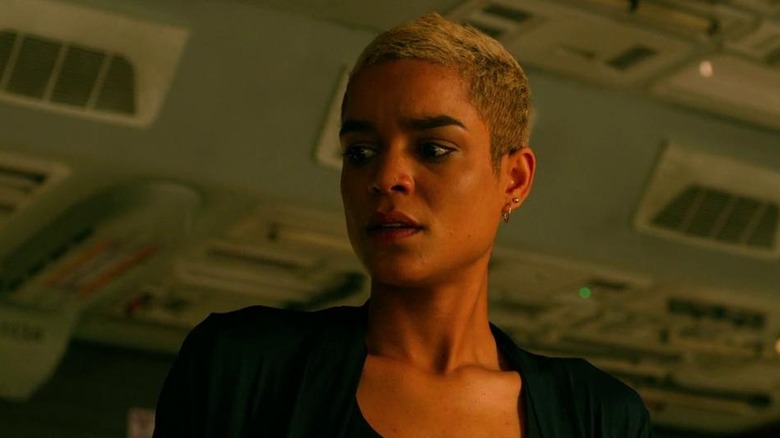
Who is Keeya Adebayo? In her entry on the DC Extended Universe Wiki, Keeya is described as a "supportive but tired woman reluctantly dealing with her wife's new secretive government job." While I wish I could tell you more about her beyond that brief and boring sentence, I am struggling.
Keeya proves stakes for Adebayo's arc. This much is certain. If Adebayo's journey through "Peacemaker" is accepting that she's born to do big things — shattering shadowy government bureaucracies, stopping alien invasions, etc. — on behalf of the greater good, then Keeya represents what she stands to lose. Adebayo wagers on both love and "the good life" by betting on herself.
So, Keeya is essential to "Peacemaker," but if you look past Elizabeth Faith Ludlow's colorful performance, it's also clear that she's thinly drawn. That's true even before she disappears from the show for almost the entirety of its final four episodes. Or, to put it another way, during the opening credits the camera lingers on Keeya flashing double middle-fingers at the audience. She seems spunky, forthright, and charismatic, but that's the clearest portrait of Keeya we get. Here's hoping her blanks get filled in next season.
Larry Fitzgibbon
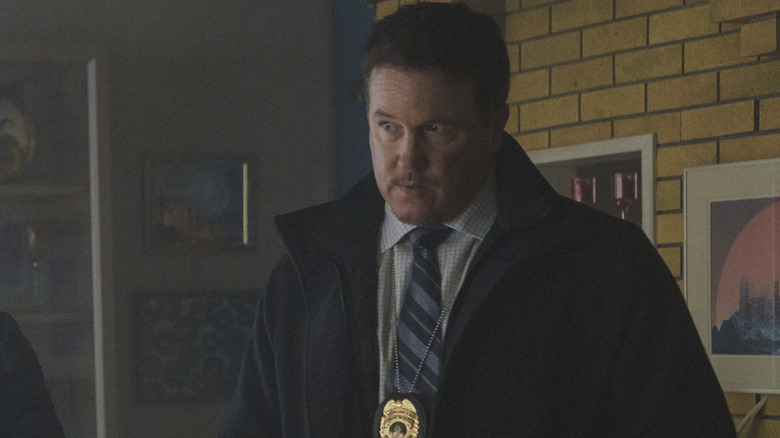
Before Larry Fitzgibbon is murdered and taken over by a Butterfly, Goff, possessing Officer Song, reveals who he really is. "I do feel that she was fond of you," Goff says. This comes moments after Fitzgibbon pleads with Song to seek medical attention, and mere hours after he valiantly tries to save her life. It all adds up: Larry Fitzgibbon is a good person trying to do his job well, and supports Sophia Song with unwavering stability.
Have we seen characters like Fitzgibbon before? Yes, absolutely. In a lesser show, both Song and Fitzgibbon would serve as basic copaganda, or would be as dull as a JC Penny ad. Here, both have strong personalities. Fitzgibbon specifically comes across as a quietly progressive lifer at the Evergreen Police Department. He's happy to josh it up with Song, and equally quick to combat the bigotry around her. He's overworked. He's remarkably devoted. Those qualities get him killed, but not before we grow as fond of him as Sophie Song was.
Jamil
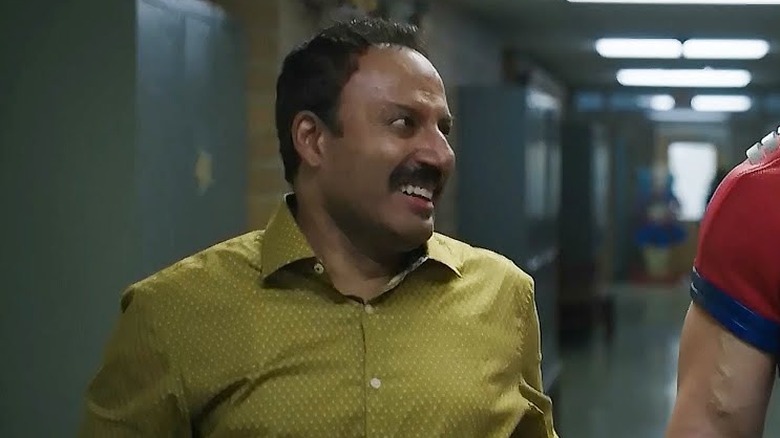
Jamil is a puzzle box wrapped in an enigma. Within his first 15 seconds of screen time, the hospital janitor shames Peacemaker for their shared love of weed, admits that he went to MIT but hated "the responsibility," and deems himself untrustworthy — twice. This is a lot, and that's crucial. As the first person we meet on the series (beyond a criminal anti-hero who has made a vow to fight for peace at any cost, no matter how many people he has to kill to get it), Jamil's conversation with Peacemaker provides proof that the heroes on this show might be complicated, but their hearts are in the right place. Well, mostly.
Jamil's flippant dialogue is crucial, too. Great art teaches you how to consume it, either by giving you time to adjust to its particular rhythms, or by teaching you how to see what actually matters. Jamil and Peacemaker's back and forth is instructional: Through it, you learn that even the dumbest exchanges carry the potential for high drama. "Peacemaker" needs Jamil to set this up for the viewers, and he does so exceptionally. He's used sparsely, but Jamil really might be the show's secret weapon. Maybe he's not such an enigma after all.
Judo Master
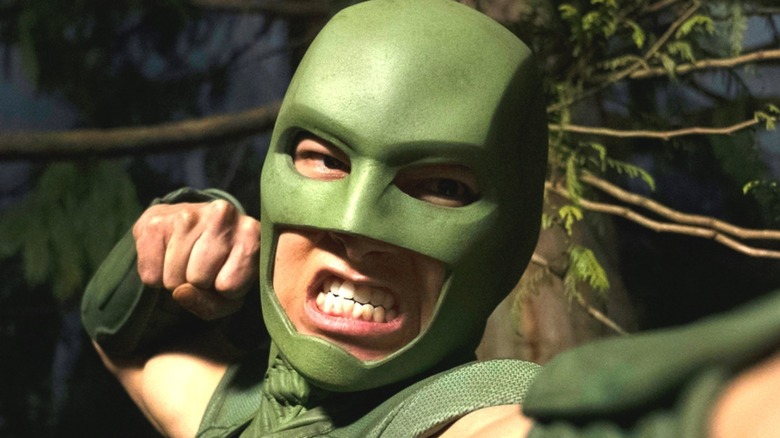
"Show, don't tell" is a classic piece of writing advice, but I'm sure that whoever coined those words didn't imagine they'd apply to a martial artist wearing a lime costume who wolfs down Cheetos after casually smashing two racists' windpipes. But that's just one of the many memorable things that Judo Master does without uttering a word. Like many of the fights the character picks, it speaks volumes about him.
As we learn during episode 8, "It's Cow or Never," Judo Master has allied himself with the Butterflies because he believes, like they do, that humans are no longer able to care for the planet or themselves. He doesn't see himself as a mercenary, but rather a bodyguard for the Butterflies and a noble champion of their cause. He survives all manner of violence to further their agenda. That he doles out punishment to the hate-speech spitting meatheads mentioned above is further proof that the character has a moral compass, however wildly it's spinning when we meet him. "Peacemaker" shows us about Judo Master while telling us very little, resulting in a funny and fascinating character.
Captain Locke
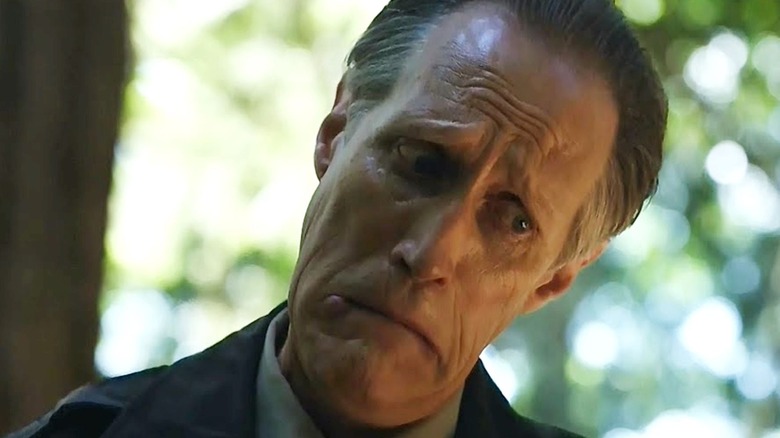
Captain Locke is one of the show's best surprises. He provides a bigger shock than the Justice League's cameo, and delivers a stunner larger than the reveal that the "cow" is a giant caterpillar with udders. Locke's true nature is a masterful reveal, because the show sets him up to be an alien antagonist and, when it turns out that he isn't, some of the themes that "Peacemaker" has been toying with cruelly snap into place.
Locke is installed as the captain of Song and Fitzgibbon's precinct by Clemson Murn. It appears as though Murn, a Butterfly, is using Locke to run interference. But while Locke is there to make the police's lives more difficult, he's actually a human. So, when we witness Locke misogynistically chiding Officer Song or toying with the officers he goes on to murder, his ice-cold actions stand in stark contrast to Peacemaker's. Christopher Smith is reckoning with the notion that he no longer wants to kill for peace. Locke doesn't just have no trouble doing so, he loves doing so. As played by Christopher Heyerdahl, that passion becomes as eccentrically funny as it is wildly frightening.
Locke seems poised to be one of the show's big bads before he is taken over by a Butterfly, and the fact that he makes such a strong impression in so little time moves him up the ranks with ease. I'm just as surprised as you are.
Sophie Song (And Goff)
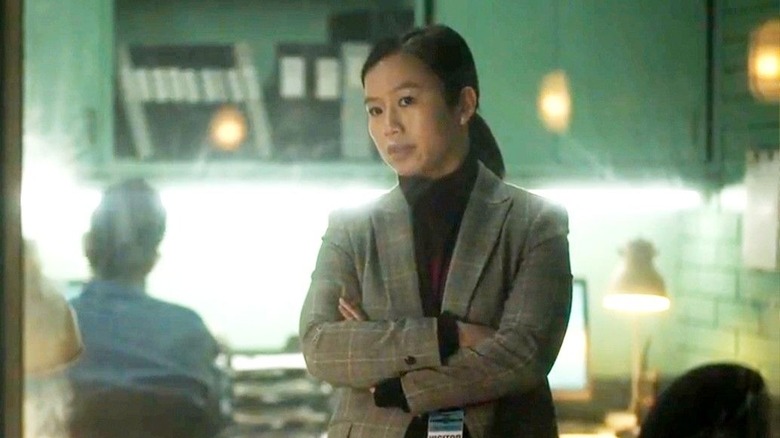
James Gunn hasn't been shy about praising the "Peacemaker" cast, but when tweeting about Annie Chang, Gunn offered a particularly incandescent compliment: "When @Itsanniechang auditioned she had to audition as TWO characters - Sophie & Goff. Some actors were great at one or the other but only Annie was great at both."
That lede buries the key to appreciating Sophia Song, who's a memorable character well before the Butterflies take her over. Song is the opposite of Goff. Goff breaks the rules in order to ensure humanity's existence. Song follows them until her need for justice takes precedence, pushing her to free a white supremacist she loathes in order to catch the criminal she's after. Song is steadfast in her approach to policing, while Goff is quick to act, even approaching recklessness. And Song is quietly affectionate, while Goff beams with compassion and, at times, loathing.
No, it isn't fair to discuss Song through the lens of Goff alone but, in the words of The Rolling Stones, "You don't know what you got 'till it's gone." The depth of Song's character is revealed, both by "Peacemaker" as a show and Chung as an actress, in her absence. Both deserve glowing praise.
Auggie Smith (The White Dragon)
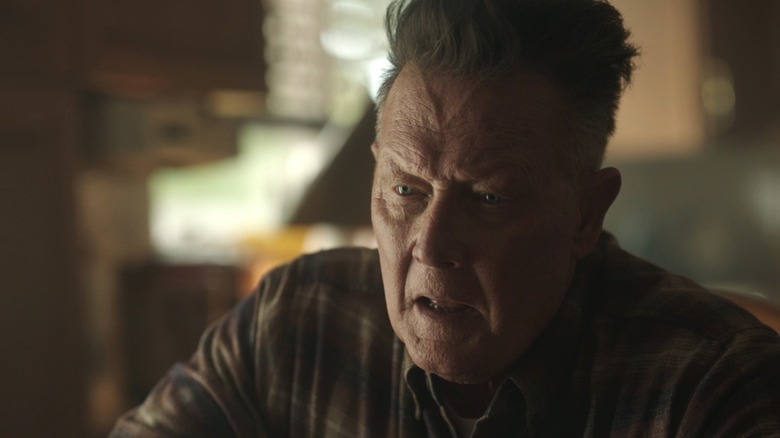
In the "Peacemaker" pilot, when Peacemaker wants to make his father Auggie happy, he describes how a father tormented his son by locking the boy in a rat-filled crate for 24 hours, how the son's acne scars were really caused by rat bites, and how the son grew into a broken shell of a person as a result. Auggie laughs so hard that he chokes. After he recovers, he moans at his son, "The [guy] tortured by rats ... he wasn't the one who shot you?"
This is Auggie, the White Dragon, in microcosm. He is a man so consumed by hate that his only path to happiness is loathing disguised as joy. There is little that he doesn't resent, be it his son Chris or people of color. There's even less that he won't do to stay in power, whether that means tearing Chris down or rallying all his white-power buddies in prison. Auggie literally sits on a bevy of weapons while wasting away from anger, just waiting for the opportune moment to ruin another one. He has no shame and no fear, just bigotry and the means to spread it however he likes. It's no wonder that Auggie haunts Chris at the conclusion of "Peacemaker." By then, he's haunting the audience as well.
Emilia Harcourt
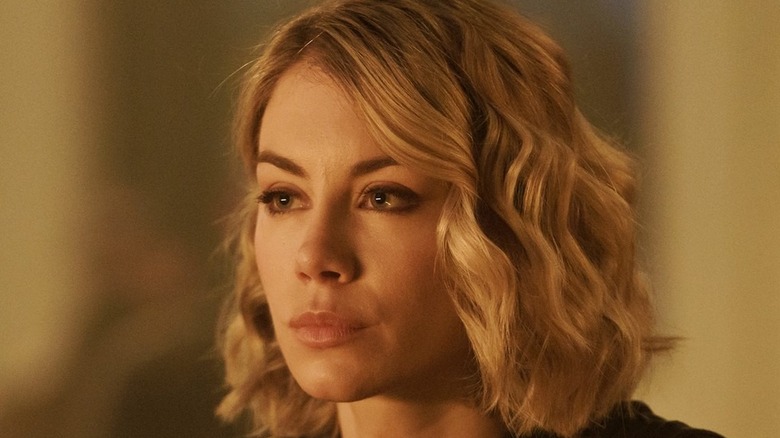
In the penultimate episode of "Peacemaker," Emilia Harcourt decides that Peacemaker is only "85% an a**hole." It's a lovely moment, made all the more poignant because Harcourt herself is 85% a you-know-what, even if those around her won't say so out loud.
No, really. Emila Harcourt is not a nice person. She is as likely to hurl insults someone's way as she is to break their wrist in a bar fight. Her anger is born of institutionalized misogyny, the stress inherent to spycraft, and the general unpleasantness in her soul. But Emilia Harcourt is also a kind person. Underneath her harsh exterior is a genuine desire to be good. That's why the team makes her leader when Murr falls. That's why the 11th Street Kids' text thread makes her emotional defenses collapse. Harcourt is proof that people can be great without being agreeable, and both the show and its characters cherish that dichotomy.
So, when Harcourt tells Peacemaker that he's become just a little bit less of a jerk, it isn't an act of forgiveness. It's game recognizing game — and there's almost no one you'd rather play with on the field of superheroics than Emilia Harcourt.
Eagly
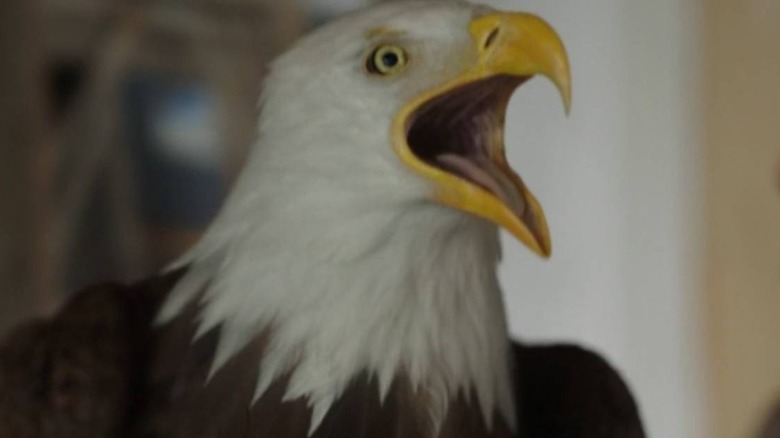
An eagle has served as a symbol of governmental power since Roman times. In America, where it was adopted as the country's emblem in 1782, it represents patriotic freedom. I mention all this because when Eagly, Peacemaker's best friend (who is also a bald eagle), acts like an actual bald eagle would, it's absolutely loaded with subtext. How could it not be? Eagly is the pet of a man who has an American flag painted across the front of his house, who took an oath to protect the country using violence, and who has a white nationalist for a father. Eagly is all but destined to be a metaphor.
And, appropriately, he is. The question of what a country can — or should — tolerate runs straight through Eagly's every action. However, as both a bird and a best friend, Eagly rules. He brings Peacemaker food. He laughs at inappropriate jokes, puts his life on the line for his buddy, and gives his bestie a hug when the mission is over. At the end of the day, Eagly's legacy is as messy as those of the people who founded America, but he still, somehow, represents the country's untapped potential. Peacemaker is right to call him "no ordinary eagle." In reality, he's one of the show's MVPs.
Clemson Murn (Ik Nobe Llok)
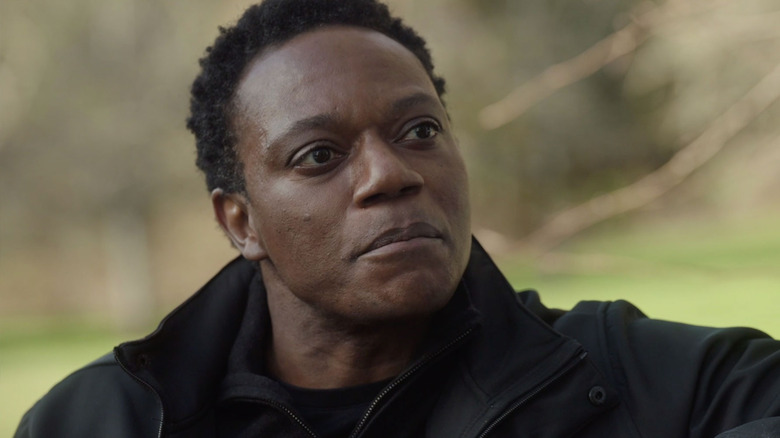
Clemson Murn was a bad man. Everyone knows it. Even Peacemaker, who casually slaughters a camp full of freedom fighters to show up his teammate in "The Suicide Squad," expresses reservations about working for Murn. But the person who understands the depths of Murn's evil better than anyone else isn't a person at all -- it's a Butterfly.
By the time that we meet Murn, he is actually Ik Nobe Llok, a rogue Butterfly out to stop his compatriots' enslavement of our planet. Now, Llok has a moral compass. When he admits to Adebayo that he's been lying to her the whole time, he practically shrinks. In his final moments of life, he sacrifices himself for a race of people not his own. As a vessel, the body of Murn is proof that change, however unlikely, is always possible; Murn was a mercenary and a murderer, but Llok makes him an extrodinary leader.
But it's not all about the old Murn. As a character, Llok is one of Peacemaker's most beautiful creations. The Butterfly believes in what's best for this world, despite mounting evidence to the contrary. When he passes, it's no wonder that Gunn lets us see him in his Butterfly form. As we knew him, Murn was a great man. Ik Nobe Llok, though, was a great Butterfly — and, by extension, a pretty decent human, too.
John Economos
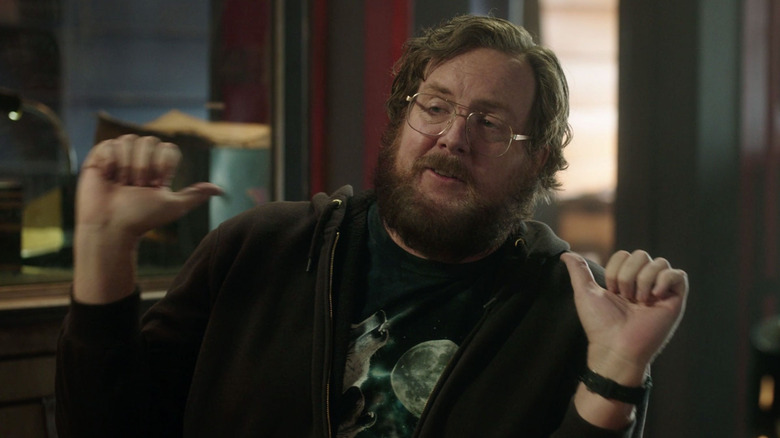
John Economos denies that he dyes his beard. It's one of his defining traits, as essential to his personality as radio psychiatry is to Frasier Crane. But, during the stellar finale of "Peacemaker," when Economos enters the field to do some recon work, he's accused of exactly that by the Butterflying controlling Larry Fitzgibbons. "The man you've taken over," Larry growls, "why did he color his beard all strange like that?" Economos pauses for a moment. "He thought it made him look younger and more handsome," he answers. "But he was also lazy ... and he wouldn't dye his roots regularly. And, when he did, he used the cheapest brand, because he was severely underpaid. But mostly, because he thought nobody noticed. Until recently."
This exchange captures everything that makes Economos special. Over the course of eight episodes, Economos goes from being nearly invisible to fully seen by his new friends. His journey comes through his steadfast bravery (he kills a murderous gorilla with a chainsaw), quiet loyalty (he keeps Murn's identity a secret), and his willingness to risk it all for his teammates and their mission. But Economos' admission is also tactical. The Butterflies are blunt in their assessments of human behavior and Economos, to his chagrin, must admit his shame to survive. He's always been the smartest guy in the room, and by the end of the season, the 11th Street Kids see that clearly. Thankfully, the audience does too.
Leota Adebayo
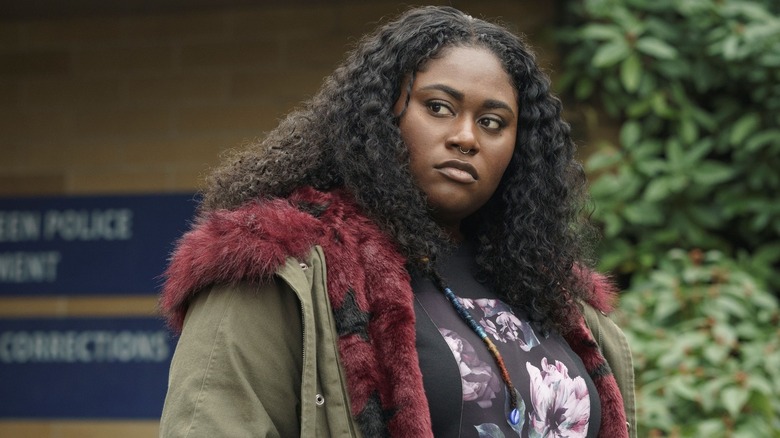
Even before Leota Adebayo comes to realize that she was, in her own words, "made for this s***," we can see that she was born for it. She is the daughter of Amanda Waller, whose morally gray actions have both saved the world and cost many, many lives. Adebayo's legacy is global conflict. There's nowhere she belongs more than on the frontlines of a fight against hostile alien invaders.
So, what's notable about Amanda Waller's offspring, then, is how not like Amanda Waller she is. Adebayo does not excel at deception. Despite planting false evidence on Peacemaker and manipulating Vigilante into making an attempt on Auggie Smith's life, Adebayo is at her best when she's being transparent. She is nakedly honest with Peacemaker and finds a loyal friend and teammate as a result. She pushes her wife away, only to save the world with her in mind. When the dust has settled on the Butterflies' attempted takeover of Earth, she exposes Waller's covert operations for what they are, holding the proverbial smoking gun during a televised press conference.
Adebayo is more than a fierce spirit and loveable goof. She blazes a new trail forward for herself, the 11th Street Kids, and her mother's cynical brand of espionage in every single episode. She truly was made for this.
Vigilante
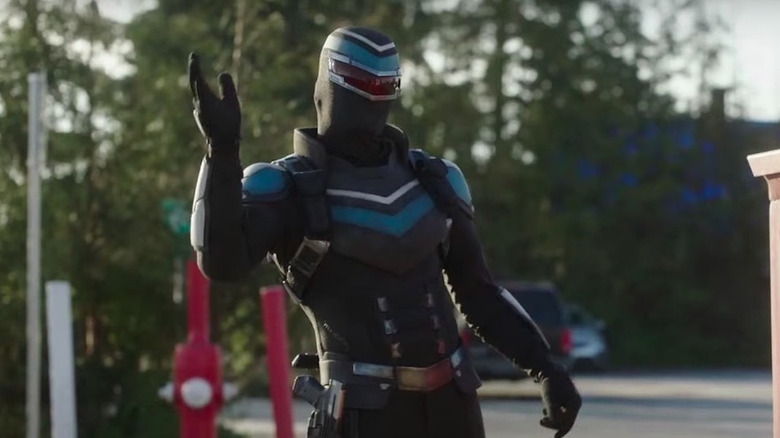
Vigilante has the most fascinating arc on "Peacemaker" — which is to say that he barely has one.
Consider this: Vigilante goes from being Peacemaker's best friend to being Peacemaker's best friend. He doesn't grow in any obvious ways. In fact, there's an argument to be made that his predilection for violence only increases over the series' eight episodes. That's not great! But one of the many reasons why /Film's own Danielle Ryan named "Peacemaker" James Gunn's masterpiece is its examination of what makes a hero, and that exploration finds its most complicated and fascinating subject in Vigilante.
To rip off a delicate band-aid, there is almost zero doubt that Vigilante is coded as being on the spectrum. But rather than apply a traditionally abled arc to a neurodivergent person, James Gunn decides to let Vigilante grow not in leaps and bounds, but rather in how his own show considers him. When we meet the man known as Adrian Chase, he is working at a diner, deluded by the notion that Peacemaker is his best friend. By the end of the series, he actually is.
In our final glimpse at him, Vigilante is committing an act of murder out of deep affection for Peacemaker. "Peacemaker" does not laugh at Vigilante's affection. The show laughs with it, and then supports it whole-heartedly. This willingness to let Vigilante remain Vigilante is one of the series' most quietly graceful touches. That's an arc that I can get behind.
Peacemaker
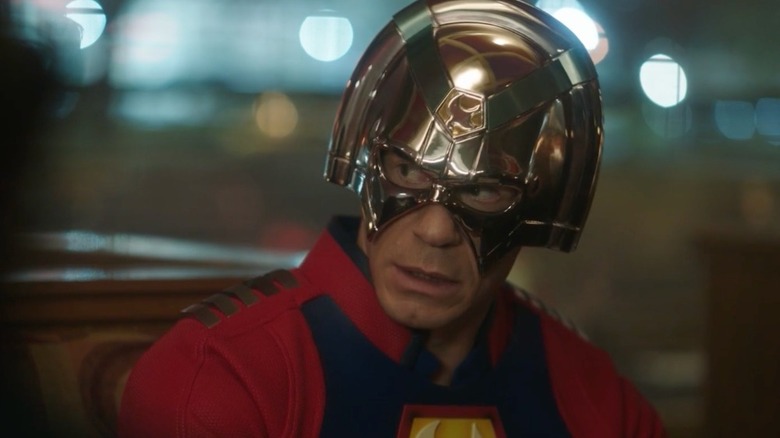
John Cena is becoming a very special performer, but nothing he has done before — heck, nothing James Gunn has done before — prepared me for the journey that Peacemaker takes in this show. When "A Whole New Whirled" begins, the Peacemaker identity is how Chris Smith escapes from himself, the man who was raised by a white nationalist and accidentally killed his brother. By the time the show closes, Peacemaker and Chris Smith are one and the same. That silly helmet no longer obscures the man as much as it reveals the person he really is.
And who is that, exactly? No less than a well-meaning lug. No one would call Chris the brightest guy in the room, but he's sharp as a tack when he has to be, and he's more soulful than he'll ever let on. He believes in miracles. He plays the piano. To see Chris for all the great, awful, silly, and endearing things he contains means reconsidering with how we look at others in our lives, be they friends or those we encounter on social media. Peacemaker is more than a character. He's a reckoning for anyone who encounters him. It has been a long time since any persona non grata in the comic book media space carried that kind of power. Because Peacemaker does, he's easily the show's best character.
Read this next: Joker's Wild: Ranking The Cinematic Versions Of The Clown Prince Of Crime
The post The Best Characters in Peacemaker, Ranked appeared first on /Film.
0 Commentaires